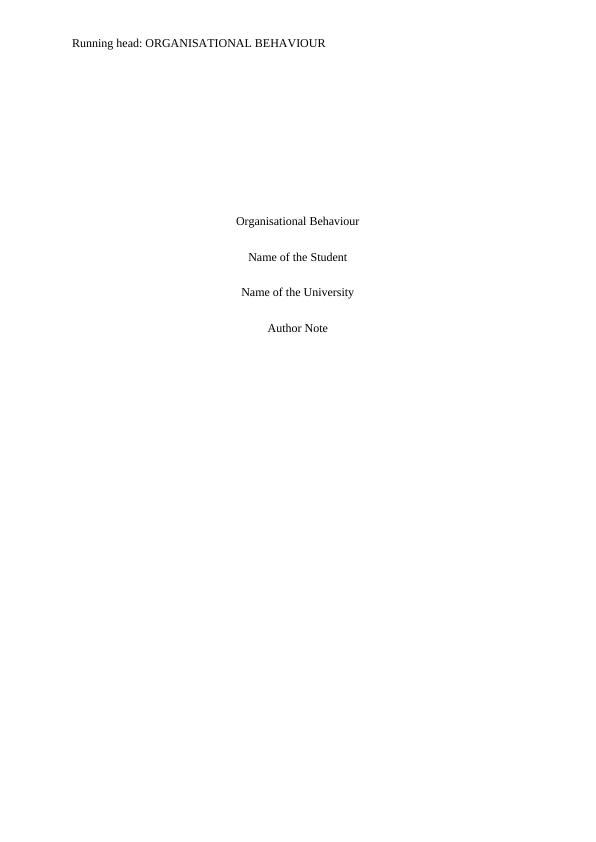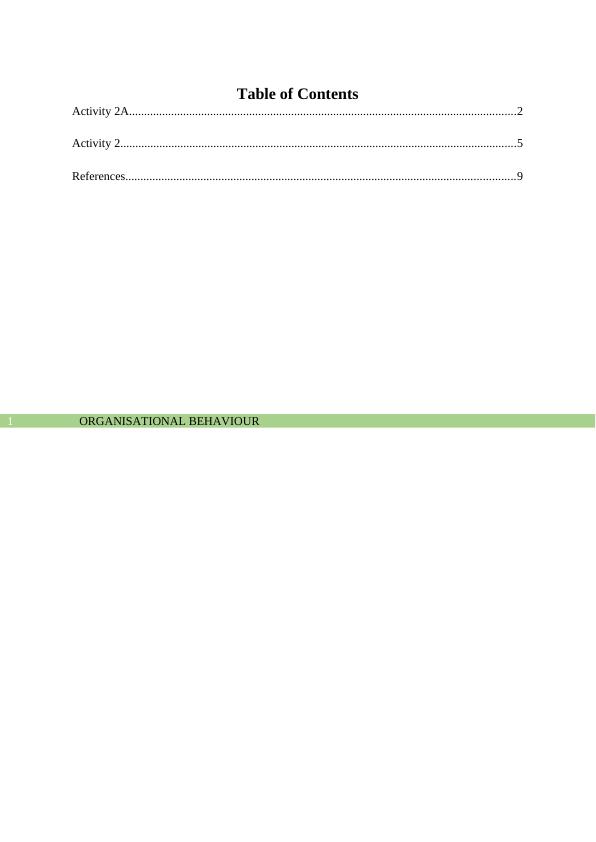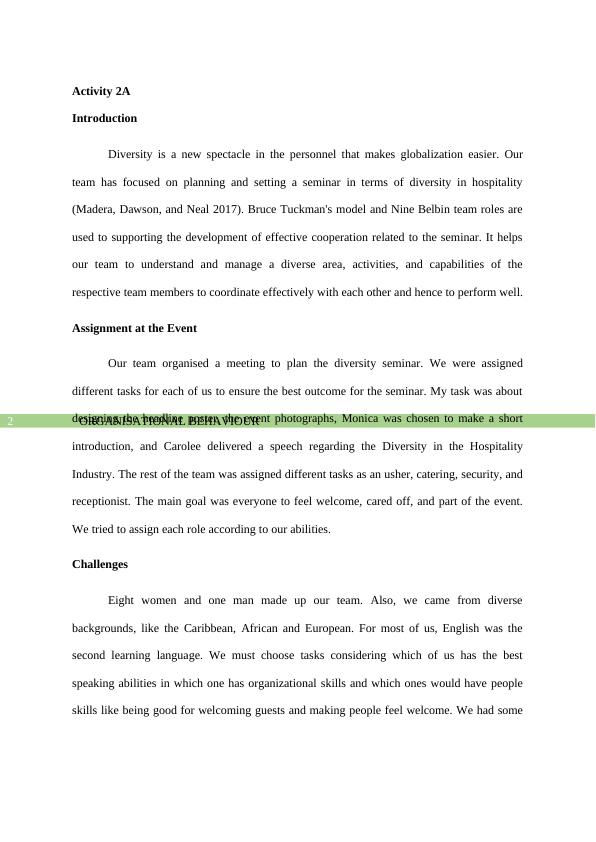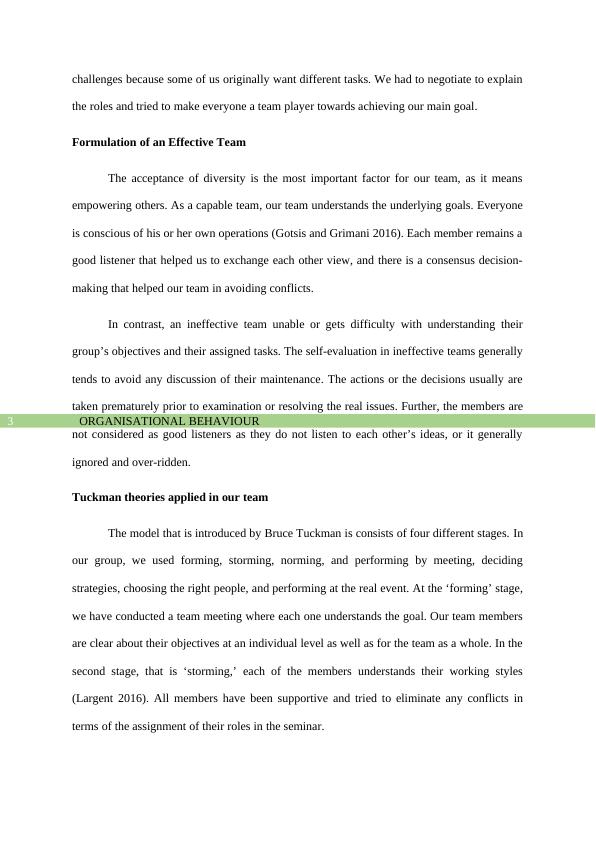International Journal of Project Management Docx.
Added on 2022-08-22
12 Pages2650 Words24 Views
Running head: ORGANISATIONAL BEHAVIOUR
Organisational Behaviour
Name of the Student
Name of the University
Author Note
Organisational Behaviour
Name of the Student
Name of the University
Author Note

ORGANISATIONAL BEHAVIOUR1
Table of Contents
Activity 2A.................................................................................................................................2
Activity 2....................................................................................................................................5
References..................................................................................................................................9
Table of Contents
Activity 2A.................................................................................................................................2
Activity 2....................................................................................................................................5
References..................................................................................................................................9

ORGANISATIONAL BEHAVIOUR2
Activity 2A
Introduction
Diversity is a new spectacle in the personnel that makes globalization easier. Our
team has focused on planning and setting a seminar in terms of diversity in hospitality
(Madera, Dawson, and Neal 2017). Bruce Tuckman's model and Nine Belbin team roles are
used to supporting the development of effective cooperation related to the seminar. It helps
our team to understand and manage a diverse area, activities, and capabilities of the
respective team members to coordinate effectively with each other and hence to perform well.
Assignment at the Event
Our team organised a meeting to plan the diversity seminar. We were assigned
different tasks for each of us to ensure the best outcome for the seminar. My task was about
designing the headline poster, the event photographs, Monica was chosen to make a short
introduction, and Carolee delivered a speech regarding the Diversity in the Hospitality
Industry. The rest of the team was assigned different tasks as an usher, catering, security, and
receptionist. The main goal was everyone to feel welcome, cared off, and part of the event.
We tried to assign each role according to our abilities.
Challenges
Eight women and one man made up our team. Also, we came from diverse
backgrounds, like the Caribbean, African and European. For most of us, English was the
second learning language. We must choose tasks considering which of us has the best
speaking abilities in which one has organizational skills and which ones would have people
skills like being good for welcoming guests and making people feel welcome. We had some
Activity 2A
Introduction
Diversity is a new spectacle in the personnel that makes globalization easier. Our
team has focused on planning and setting a seminar in terms of diversity in hospitality
(Madera, Dawson, and Neal 2017). Bruce Tuckman's model and Nine Belbin team roles are
used to supporting the development of effective cooperation related to the seminar. It helps
our team to understand and manage a diverse area, activities, and capabilities of the
respective team members to coordinate effectively with each other and hence to perform well.
Assignment at the Event
Our team organised a meeting to plan the diversity seminar. We were assigned
different tasks for each of us to ensure the best outcome for the seminar. My task was about
designing the headline poster, the event photographs, Monica was chosen to make a short
introduction, and Carolee delivered a speech regarding the Diversity in the Hospitality
Industry. The rest of the team was assigned different tasks as an usher, catering, security, and
receptionist. The main goal was everyone to feel welcome, cared off, and part of the event.
We tried to assign each role according to our abilities.
Challenges
Eight women and one man made up our team. Also, we came from diverse
backgrounds, like the Caribbean, African and European. For most of us, English was the
second learning language. We must choose tasks considering which of us has the best
speaking abilities in which one has organizational skills and which ones would have people
skills like being good for welcoming guests and making people feel welcome. We had some

ORGANISATIONAL BEHAVIOUR3
challenges because some of us originally want different tasks. We had to negotiate to explain
the roles and tried to make everyone a team player towards achieving our main goal.
Formulation of an Effective Team
The acceptance of diversity is the most important factor for our team, as it means
empowering others. As a capable team, our team understands the underlying goals. Everyone
is conscious of his or her own operations (Gotsis and Grimani 2016). Each member remains a
good listener that helped us to exchange each other view, and there is a consensus decision-
making that helped our team in avoiding conflicts.
In contrast, an ineffective team unable or gets difficulty with understanding their
group’s objectives and their assigned tasks. The self-evaluation in ineffective teams generally
tends to avoid any discussion of their maintenance. The actions or the decisions usually are
taken prematurely prior to examination or resolving the real issues. Further, the members are
not considered as good listeners as they do not listen to each other’s ideas, or it generally
ignored and over-ridden.
Tuckman theories applied in our team
The model that is introduced by Bruce Tuckman is consists of four different stages. In
our group, we used forming, storming, norming, and performing by meeting, deciding
strategies, choosing the right people, and performing at the real event. At the ‘forming’ stage,
we have conducted a team meeting where each one understands the goal. Our team members
are clear about their objectives at an individual level as well as for the team as a whole. In the
second stage, that is ‘storming,’ each of the members understands their working styles
(Largent 2016). All members have been supportive and tried to eliminate any conflicts in
terms of the assignment of their roles in the seminar.
challenges because some of us originally want different tasks. We had to negotiate to explain
the roles and tried to make everyone a team player towards achieving our main goal.
Formulation of an Effective Team
The acceptance of diversity is the most important factor for our team, as it means
empowering others. As a capable team, our team understands the underlying goals. Everyone
is conscious of his or her own operations (Gotsis and Grimani 2016). Each member remains a
good listener that helped us to exchange each other view, and there is a consensus decision-
making that helped our team in avoiding conflicts.
In contrast, an ineffective team unable or gets difficulty with understanding their
group’s objectives and their assigned tasks. The self-evaluation in ineffective teams generally
tends to avoid any discussion of their maintenance. The actions or the decisions usually are
taken prematurely prior to examination or resolving the real issues. Further, the members are
not considered as good listeners as they do not listen to each other’s ideas, or it generally
ignored and over-ridden.
Tuckman theories applied in our team
The model that is introduced by Bruce Tuckman is consists of four different stages. In
our group, we used forming, storming, norming, and performing by meeting, deciding
strategies, choosing the right people, and performing at the real event. At the ‘forming’ stage,
we have conducted a team meeting where each one understands the goal. Our team members
are clear about their objectives at an individual level as well as for the team as a whole. In the
second stage, that is ‘storming,’ each of the members understands their working styles
(Largent 2016). All members have been supportive and tried to eliminate any conflicts in
terms of the assignment of their roles in the seminar.

End of preview
Want to access all the pages? Upload your documents or become a member.
Related Documents
Continuing Professional Development and Strategic Management - Individual Reflective Accountlg...
|7
|2267
|118
Organisational Behaviour: Effective Team, Tuckman's Theory, Path Goal Theory, and Team Development Theorieslg...
|9
|2220
|106
Organisational Behaviour: Effective Teams and Virtual Teamslg...
|8
|2124
|94
Reflection based on Tuckman Theorylg...
|5
|846
|1
Reflective Report on Group Worklg...
|5
|1293
|20
Teamwork Reflective Journal PDFlg...
|8
|1949
|626
